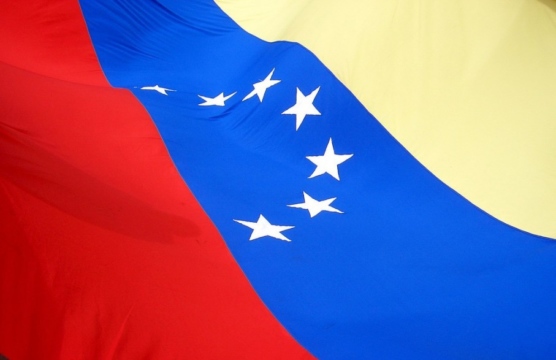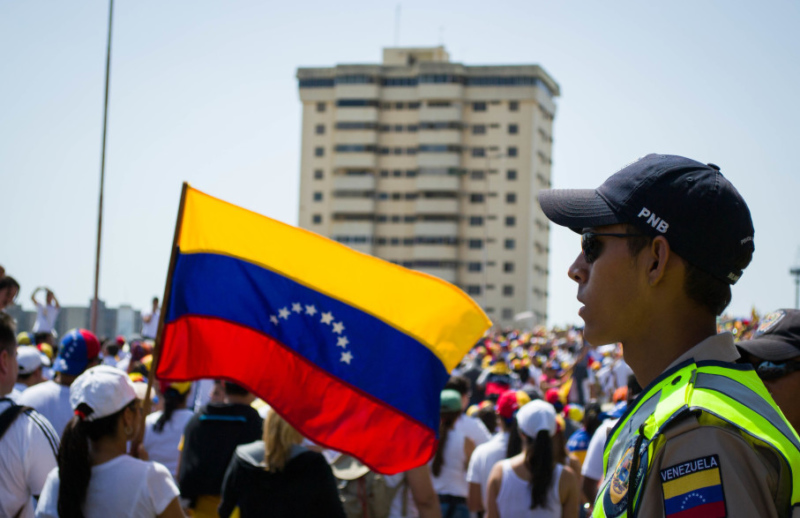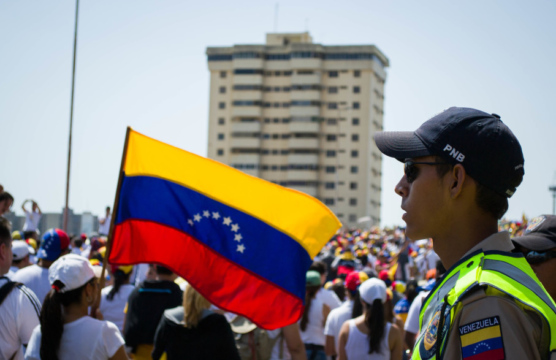
Falling Oil Prices Push Venezuela, Maduro Closer to the Edge
With crude oil prices down 25 percent since June and holding at roughly $86 a barrel on Tuesday, Venezuela is getting nervous.
This post is also available in: Español
Events in the Ukraine have surely lifted the morale of anti-government protestors in Venezuela and probably elevated their expectations as well. The departure from office of President Nicolas Maduro, followed by the holding of new elections, no longer seems far out of reach. No question, there are many parallels between the South American and Eastern European nations. The economies of both are crises ridden. Their politics are bitterly polarized and lawlessness is rampant. Their presidents have consistently trampled on democratic principles, although both were elected to office. In both nations, each side has considered the other as a destructive, implacable adversary that needs to be defeated.
But the two countries also display some stark differences. The partisans of Hugo Chavez, Maduro’s predecessor and mentor, have now held power in Venezuela for 15 years. They have gained tight control of virtually every important institution in the country—the legislature, media, judicial system, armed forces, and national oil company, the source of most of the country’s wealth. And they have built an intensely loyal following, particularly among Venezuela’s poor, most of whom consider themselves far better off today than under previous regimes—and are in some respects. The power of the deposed Ukrainian president and his supporters was far less consolidated and certain.
Probably more important still, the government of Maduro, in responding to the protests, has so far been largely free of external pressures. Ukraine’s European neighbors were quick to condemn the excessive use of force against demonstrators. Latin American governments, all but one led by constitutionally elected leaders, however, have largely avoided any criticism of the Venezuelan government’s repressive actions and its violations of democratic norms and legal procedures. Many Latin American governments have openly endorsed President Maduro’s response, while the rest have done little more than weakly encourage talks with the opposition forces.
The strongest supporters of the Maduro government are four small countries that have long been Venezuela’s ideological allies—Bolivia, Ecuador, Nicaragua, and Cuba—plus Argentina. Brazil has also supported Venezuela’s actions, although in a more muted fashion. There are some governments that have kept silent because the important economic interests involved in their relations with Venezuela. Others have been intimidated by Maduro’s angry, vituperative responses to even mild reproaches or suggestions. Still others want to keep the peace with their own leftist parties and movements.
It should be clear that the government has the upper hand in this confrontation. It holds virtually all important the levers of power, maintains a secure base of support in the population, and faces minimal external pressure or criticism.
The United States, accused by Maduro of fomenting the protests and plotting his ouster, has been the harshest critic of the Venezuelan government and has the strongly urged a change in course. But the US—absent any support from Latin America—has only limited influence on events in Venezuela, which has long treated Washington as an enemy. The two countries have not had ambassadors in place for nearly four years, and since the protests began, three US embassy officials have been expelled from Venezuela. Maduro has proposed an exchange of envoys to restore diplomatic ties, but it is hard to take seriously what seems to be a confused and isolated gesture. Maduro can readily demonstrate that he is, in fact, serious by calling off all attacks against the protestors, by both the government and its militant supporters, releasing those sitting in prison, and offering to open meaningful discussions with the opposition
Some in Washington have called on the US to adopt a tougher line, including curbing oil purchases from Venezuela, which remains the US’s fourth largest foreign supplier even as the levels of imports have been declining. At this point, such a move—which the some opposition figures reject —would likely be dangerously counterproductive. It would likely energize the pro-government, Chavista forces, increase their conviction that they are under siege from within and without, and leave them even more resistant to compromise with their opponents. Support for the Marduro government from the rest of Latin America would probably increase and solidify. Even Washington’s closest allies in the region would likely oppose this course.
The Venezuelan government is not invulnerable, however. There are schisms and much distrust within its ranks. Some defections have already occurred and more can be expected. The gravity of the country’s economic and security crises are draining credibility and support from Maduro. Still, it should be clear that the government has the upper hand in this confrontation. It holds virtually all important the levers of power, maintains a secure base of support in the population, and faces minimal external pressure or criticism.
What should be obvious is that the best course for all sides, and certainly for the Venezuelan nation, would be a dialogue between opposing forces that could lead to a negotiated resolution of the bitter conflict before it runs out of control. Both sides would have to give up something.
Under the circumstances, the protests—despite the enormous numbers of people who have been mobilized and the intense commitment they have demonstrated—could subside and lose their political potency. This is not uncommon after a period of massive, high-spirited demonstrations. But even if the anti-government activists are able to sustain and intensify the protests, the Maduro government will still hold its multiple advantages over the opposition. It is hard to imagine what it would take for the government to back down and give in to the protestors’ demands. To be sure, Maduro himself, particularly if he continues to manage the situation badly, could well be forced from the presidency. The Chavistas, however, are likely to prevail in a drawn out confrontation and may end up with a free hand to crack down harder than ever on the opposition.
What should be obvious is that the best course for all sides, and certainly for the Venezuelan nation, would be a dialogue between opposing forces that could lead to a negotiated resolution of the bitter conflict before it runs out of control. Both sides would have to give up something.
The government would almost certainly have to release all those imprisoned for leading or taking part in the street protests, and others jailed for political speech or action. It would need to disband armed militia groups, and generally stop riding roughshod over its opponents and, instead, allow for a significant measure of free political activity—including assembly, protest, and public criticism. It would also have to loosen its restriction on the print and broadcast media, and allow for greater independence of the judiciary. What the government would gain is an end to (or at least the suspension of) the turmoil in the streets and the opportunity to govern.
For its part, the opposition would have to give up its aspirations for new elections that could produce a non-Chavista government. Instead, it would have to wait for at least two years (i.e., for the halfway point of Maduro’s six-year term) to fulfill the constitutional requirements for a recall election. But the opposition should gain greater security and some of the room it needs to carry out its political activities.
The remaining question is what it would take to bring about a productive dialogue between the government and the opposition. Since, neither side seems ready yet to yield very much of anything to the other, it will take outside help to prepare the way.
Surely, Brazil, a country with global leadership aspirations, should be doing all it can to stop the turbulence that threatens neighboring Venezuela.
The Brazilian and Cuban governments would have the most sway with President Maduro, and might be able to convince him to open talks with his opponents, and respond responsibly to their demands and concerns, and be prepared to make concessions.
Since 2003, when Lula da Silva became president, Brazil has maintained a close, supportive relationship with Venezuela. Brazil chaired a “friends of Venezuela” group that helped end an earlier clash between the Chavez government and the opposition. Lula amply praised Hugo Chavez’ leadership and openly endorsed him for re-election as president. Brazil was most responsible for bringing Venezuela into the Mercosur trade pact. Surely, Brazil, a country with global leadership aspirations, should be doing all it can to stop the turbulence that threatens neighboring Venezuela.
Cuba may have even more influence than Brazil. Chavez claimed Cuba was his inspiration and model. The Venezuelan leader developed a close relationship with Fidel Castro, and consistently looked to him for advice. And Cuba has played a crucial role in building Venezuela’s security and intelligence organizations, and its doctors and teachers have provided services to Venezuela’s poor for many years. Cuba has a good reason for concern about the future of its South American ally. Venezuela has kept the Cuba afloat for a dozen years with annual subsidies estimated at $2 to $4 billion.
The Venezuelans need and deserve outside assistance to resolve their increasingly tragic and dangerous confrontation, and it should come from their neighbors.
If opposition leaders need to be persuaded to sit at the negotiating table with the Venezuelan government, the task will fall mainly to the US—which has been the most consistent defender of the opposition’s political rights. Washington could also help by pressing Brazil and other Latin American nations to do their part to get the Maduro government to the table.
The Venezuelans need and deserve outside assistance to resolve their increasingly tragic and dangerous confrontation, and it should come from their neighbors. The Latin American governments should not be taking sides. They should be giving priority attention to encouraging a peaceful solution to the nation’s political strife, and helping to restore civility and democratic politics to Venezuela.
With crude oil prices down 25 percent since June and holding at roughly $86 a barrel on Tuesday, Venezuela is getting nervous.
Can the government led by Nicolas Maduro survive the wave of street protests that have spread throughout Venezuela over the past two weeks?
Deadly protests, the largest since President Nicolás Maduro’s election last year, have wracked Venezuela in recent weeks.
 María Alejandra Mora / CC BY-SA 3.0
María Alejandra Mora / CC BY-SA 3.0
